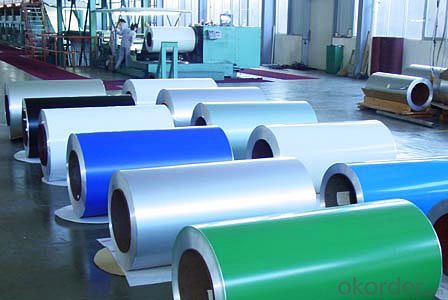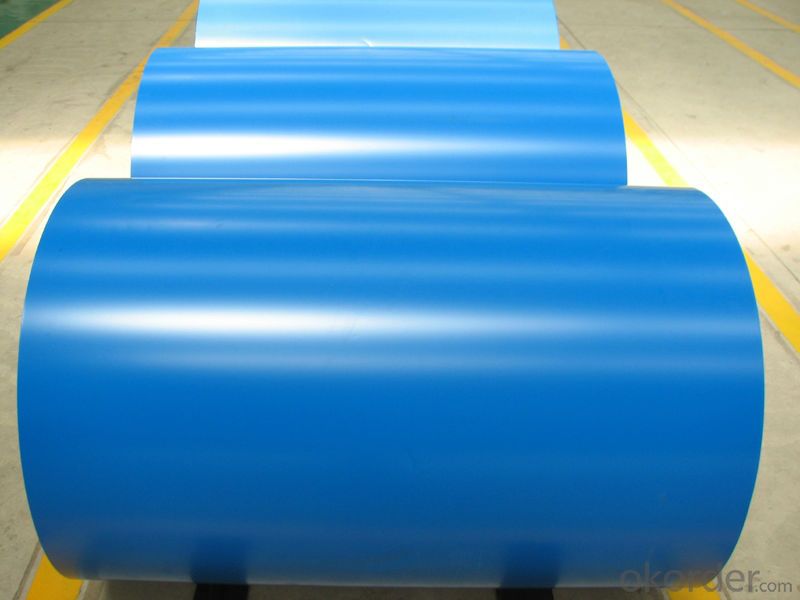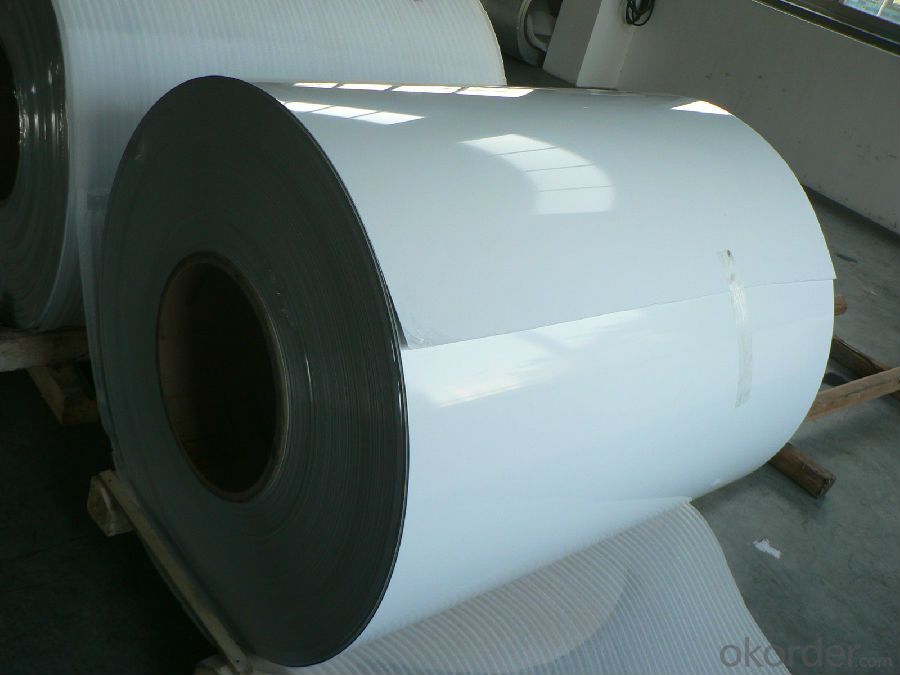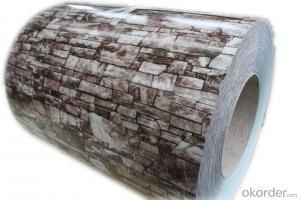Aluminium Color Coated Coil for Roofing Application
- Loading Port:
- Shanghai
- Payment Terms:
- TT OR LC
- Min Order Qty:
- 5 m.t.
- Supply Capability:
- 2000 m.t./month
OKorder Service Pledge
OKorder Financial Service
You Might Also Like
Item specifice
Structure of Aluminium Color Coated Coil for Roofing Application Description:
Coated aluminum coil/sheet are of a wide range of colors, which gives wonderful appearance no matter in residential and commercial constructions of great exhibition centers.
The coated aluminum coil/sheet have been widely used in the fields of construction and decoration( garage doors, ceiling etc.), electronic appliances, lighting decoration, air-condition air pipes, sandwich panels and drainages etc.
Main Features of the Aluminium Color Coated Coil for Roofing Application:
1) High flexibility
2) Impact resistance
3) Excellent weather-proof durability
4) Anti-ultraviolet
5) High erosion resist
Images of the Aluminium Color Coated Coil for Roofing Application:



Aluminium Color Coated Coil for Roofing Application Specification:
Alloy | A1100,A3003,A1050,A8011 etc |
Temper | H16,H18,H24 |
Thickness | From 0.024mm to 1.2mm |
Width | Standard width:1240mm |
Special width:1300mm,1520mm,1570mm,1595mm | |
Diameter | Standard dia:1200mm |
Interior dia:150mm,405mm,505mm | |
Weight | 2.5 T/coil,3.0 T/coil |
Coating | PE, PVDF, AC |
Surface | Embossed, mill finish, coated |
Color | AS to code RAL |
Gloss | 10-90%(EN ISO-2813:1994) |
Coating Thickness | PE: more than 18 micron |
PVDF: more than 25 micron | |
Coating Hardness (pencil resistance) | More than 2h |
Coating adhesion | 5J(EN ISO-2409:1994) |
Impact Resistance | No peeling or cracking(50 kg/cm,ASTMD-2794:1993) |
Flexibility (T-bend) | 2T |
MEK resistance | More than 100 |
FAQ:
a.What is monthly capacity
---CNBM is one stated own company and our monthly capacity is about 2000tons.
b. Now which countries do you export your goods?
---Now we export to South East Asia,Africa, North America,South America ect.
- Q:I had a physics exams today and it was asking whether or not a shiny surface aluminium blanket was suitable to keep the sleeper warm. I put that because it's a conductor of electricitiy, heat loss will be greater so it wont be suitable for keeping him warm. On the other hand, some other people said that because it had a shiny surface, thus a good reflector of heat, it would be suitable for keeping him warm. Are both arguments correct?
- it will only keep you warm if you're in the sun. if you're in the dark then you're whistling Dixie Allan, you taught me something new, thank you :)
- Q:What should pay attention to transporting aluminum coil?
- You must ensure the good property of the aluminum coil.
- Q:Are aluminum coils suitable for food processing applications?
- Yes, aluminum coils are suitable for food processing applications. Aluminum is a versatile and widely used material in the food industry due to its various beneficial properties. It is corrosion-resistant, non-toxic, lightweight, and has excellent thermal conductivity. These properties make aluminum coils ideal for food processing applications such as cooking, storage, and transportation. Aluminum coils can be used in the production of cookware, food packaging, and food processing equipment. They are often used in the manufacturing of pots, pans, baking sheets, and other kitchen utensils. The high thermal conductivity of aluminum ensures even heat distribution, allowing for efficient cooking and preventing hot spots. Furthermore, aluminum coils are commonly used in food packaging, including cans for beverages and canned foods. Aluminum cans are lightweight, durable, and provide a barrier against light, moisture, and air, ensuring the preservation and quality of the food products. In addition, aluminum coils are suitable for food processing equipment such as heat exchangers, evaporators, and refrigeration systems. The corrosion-resistant nature of aluminum prevents contamination and ensures the hygiene and safety of the food being processed. It is important to note that aluminum coils used in food processing applications should meet specific food-grade standards to ensure they do not leach any harmful substances into the food. These standards include regulations set by the Food and Drug Administration (FDA) in the United States and similar organizations worldwide. Overall, aluminum coils are well-suited for food processing applications due to their corrosion resistance, non-toxicity, lightweight, and excellent thermal conductivity. They are widely used in the food industry for cooking, packaging, and processing equipment, contributing to the safety and efficiency of food production.
- Q:Can aluminum coils be used in electrical cables?
- Electrical cables can indeed incorporate aluminum coils. Aluminum is widely utilized as a material for electrical conductors due to its exceptional electrical conductivity and comparatively lower cost when compared to copper. Its usage is particularly prominent in power transmission and distribution cables that necessitate long-distance transmission. Overhead power lines and underground cables often employ aluminum coils. However, it is crucial to acknowledge that aluminum possesses a lower tensile strength than copper, requiring careful design and manufacturing of the cables to ensure sufficient mechanical strength. Furthermore, achieving the same electrical performance with aluminum conductors necessitates larger cross-sectional areas compared to copper, potentially resulting in slightly larger cable sizes.
- Q:Can aluminum coils be used in the production of aluminum composite roofs?
- Aluminum composite roofs can indeed utilize aluminum coils. Due to their durability, lightweight composition, and corrosion resistance, aluminum coils are frequently employed in the manufacturing process of aluminum composite roofs. These coils can be effortlessly molded and arranged into the desired roof profile, resulting in a smooth and visually pleasing final product. Furthermore, aluminum possesses exceptional thermal and sound insulation qualities, rendering it an optimal selection for roofing purposes. Its remarkable strength-to-weight ratio additionally bolsters the overall structural stability of the roof. In summary, the utilization of aluminum coils in the production of aluminum composite roofs furnishes a dependable and enduring roofing solution.
- Q:What are the different types of surface finishes for decorative purposes?
- For decorative purposes, a variety of surface finishes are commonly used. These finishes can improve the appearance of a surface by adding texture, depth, and visual interest. Some of the most popular surface finishes for decorative purposes include: 1. Polished: Achieving a smooth and shiny surface, polished finishes create a reflective appearance. This glossy look is obtained by using abrasive materials to polish the surface. 2. Matte: Matte finishes have a flat and non-reflective surface. They are achieved by using sandpaper or other materials to create a smooth yet dull appearance. Matte finishes are often chosen for a more subtle and understated aesthetic. 3. Brushed: Creating a distinctive linear pattern, brushed finishes are achieved by brushing the surface with a wire brush or abrasive material. This finish is commonly used on metals like stainless steel, resulting in a textured and visually interesting appearance. 4. Textured: Textured finishes involve incorporating patterns or designs onto the surface through various techniques such as embossing, engraving, or applying a textured coating. These finishes add depth and dimension to a surface, creating a unique and visually appealing effect. 5. Antiqued: Designed to imitate the appearance of aged or weathered surfaces, antiqued finishes can be achieved through techniques like distressing, staining, or adding a patina. These finishes are often used to create a vintage or rustic look. 6. Metallic: Metallic finishes utilize metallic pigments or coatings to create a shiny and reflective appearance. This finish adds a touch of elegance and sophistication to a surface, making it a popular choice for decorative purposes. 7. High gloss: High gloss finishes have an extremely smooth and reflective surface, resembling a mirror-like effect. This finish is achieved by applying multiple layers of clear coat or lacquer and polishing the surface to a high shine. High gloss finishes are often chosen to create a modern and luxurious look. In conclusion, the selection of a surface finish for decorative purposes depends on the desired aesthetic and the type of material used. Each finish possesses unique qualities that can significantly enhance the overall visual appeal of a surface.
- Q:Are aluminum coils suitable for electrical insulation?
- No, aluminum coils are not suitable for electrical insulation. Aluminum is a good conductor of electricity, meaning it allows the flow of electric current rather than resisting it. In electrical systems, insulation is needed to prevent the flow of electricity and protect against short circuits or electrical shock. Materials such as rubber, plastic, or ceramic are commonly used for electrical insulation due to their high resistance to electric current.
- Q:What are the advantages of using aluminum coils in HVAC systems?
- Using aluminum coils in HVAC systems offers several advantages. Firstly, aluminum coils are significantly lighter than traditional copper coils, which makes them easier to handle and install. This not only reduces labor and transportation costs but also puts less stress on the HVAC system, resulting in less wear and tear over time. Another benefit of aluminum coils is their superior resistance to corrosion. Aluminum naturally resists rust and oxidation, prolonging the lifespan of the coils and enhancing the overall durability of the HVAC system. This resistance to corrosion also helps maintain system efficiency by keeping the coils clean and free from debris buildup. Additionally, aluminum coils have excellent heat transfer properties. They efficiently absorb and release heat, allowing the HVAC system to cool or heat the air more effectively. This improved heat transfer efficiency can lead to energy savings and reduced operating costs, as less energy is required to achieve the desired temperature. Furthermore, aluminum coils are more environmentally friendly than copper coils. Aluminum is highly recyclable, contributing to waste reduction and resource conservation. The manufacturing process for aluminum coils also requires less energy and produces fewer greenhouse gas emissions, making it a sustainable choice for HVAC systems. In conclusion, the benefits of using aluminum coils in HVAC systems include lighter weight, corrosion resistance, superior heat transfer properties, energy efficiency, and environmental sustainability. These advantages make aluminum coils the preferred choice for many HVAC professionals and homeowners.
- Q:Is it okay to combine copper with aluminum in case of minting or coin making? Thanks :)
- i think its fine
- Q:How are aluminum coils stored to prevent damage?
- Aluminum coils are typically stored in a controlled environment to prevent damage. The storage area should be clean, dry, and well-ventilated to avoid any moisture buildup that could lead to corrosion. The coils are usually stacked on pallets or racks to keep them off the ground and protect them from any potential damage from dirt, dust, or water. It is important to ensure that the storage area is free from any sharp objects or heavy items that could potentially dent or scratch the coils. Additionally, the coils should be stored in a way that prevents them from shifting or falling, which could cause deformation or other damages. Proper labeling and organization of the coils is also crucial to easily identify and access them without causing any harm. Overall, careful attention to storage conditions and handling practices is essential to maintain the integrity and quality of aluminum coils and prevent any potential damage.
1. Manufacturer Overview |
|
|---|---|
| Location | |
| Year Established | |
| Annual Output Value | |
| Main Markets | |
| Company Certifications | |
2. Manufacturer Certificates |
|
|---|---|
| a) Certification Name | |
| Range | |
| Reference | |
| Validity Period | |
3. Manufacturer Capability |
|
|---|---|
| a)Trade Capacity | |
| Nearest Port | |
| Export Percentage | |
| No.of Employees in Trade Department | |
| Language Spoken: | |
| b)Factory Information | |
| Factory Size: | |
| No. of Production Lines | |
| Contract Manufacturing | |
| Product Price Range | |
Send your message to us
Aluminium Color Coated Coil for Roofing Application
- Loading Port:
- Shanghai
- Payment Terms:
- TT OR LC
- Min Order Qty:
- 5 m.t.
- Supply Capability:
- 2000 m.t./month
OKorder Service Pledge
OKorder Financial Service
Similar products
New products
Hot products
Related keywords






























